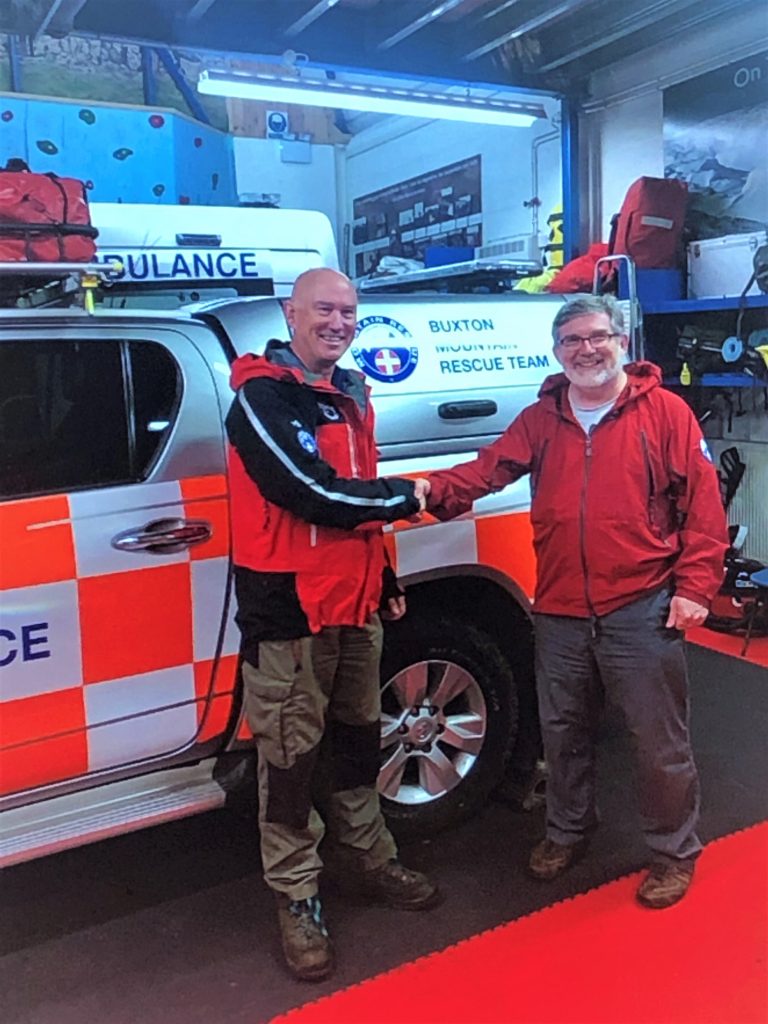The Red Jacket – Delvin’s story
Continuing our catch up with trainees who have recently been awarded their “Red Jacket”, we caught up with Delvin, for his side of the story…….
My wife and I moved to Buxton to enjoy access to the Peak District with all of the outdoor activities it presents. This gave me an opportunity to apply to Buxton Mountain Rescue Team, something which has always been at the back of my mind. Although I have never had to call on the services of a mountain rescue team it has always been reassuring to know they are there just in case the need arises. Joining the team has meant that I am now able to give something back to other outdoor folk if the need arises.
After successfully completing the application process, I attended my first Thursday training session where members of the team made me feel both very welcome, and slightly intimidated by the wealth of experience and knowledge which they had in the outdoors and the skills of mountain rescue. The first few months of training were a maelstrom of acquiring skills in first aid, radios, stretchers and the wide paraphernalia of equipment carried on a callout. At first it was very confusing trying to remember in which bag a myriad of equipment was stored and on which vehicle, and then working out what to do when you arrived with that bag at the casualty site.
Training covered some very realistic exercises, often in the dark, and in the very wet conditions in which the Peak District specialises, giving us trainees the confidence to work with full team members, and to play a part in getting to the casualty site and extracting the injured person as efficiently and safely as possible.
Running alongside the training we have taken part in a variety of other activities including fundraising, equipment and vehicle checking and social occasions, all of which help you settle down, better understand how the team operates, and what it means to be on a call-out. Eventually, and depending on how regular your attendance at training has been, comes the ‘Part One Interview’. Successful completion of this and you join the callout list and start a whole new chapter of training and skill acquisition.
Not very long after this interview came my first callout to assist with a stretcher-carry on Mam Tor. The interview had been in the late autumn so some of my early callouts were at night and later in the snow. You begin to see there is very little pattern to when and where callouts take you, and what they might involve. Motorists stranded by snow in remote locations, walkers lost on Kinder, crashed paragliders, fallen climbers, vulnerable missing persons were just some of the very wide range of jobs attended. You begin to understand the commitment required to be a full team member. Personal kit is always readily to hand, and organised for when the call out comes; and that can be at any time, day or night. Family walks might need to be abandoned, bike rides cut short, cups of tea left to go cold and meals put in the fridge to be reheated in the micro-wave a few hours later, and at night, sleep will be disturbed. Its all worth it though to be part of this rescue team.
For many people when they learn first aid on a course, their new skills are often rarely used. When a callout comes out we know that someone needs help, at a location where other emergency services will need our specialist skills to assist, so there is a palpable sense of relief when team members begin to arrive at the site, and this gives us a great sense of fulfilment and pride in what we can do to help. That sense of being part of a bigger picture and supporting the local community is what helps motivate many team members.
It’s important to get your family on board so they are sympathetic to the disruption caused when the phone pings. My wife saw this potential and decided to join the Support Team and be part of the wide-ranging activities we undertake.
There is no doubt that being a team member is a huge commitment, and not something to be taken lightly. However, the flip side is the sense of fulfilment and achievement when a successful job is completed, and a casualty taken safely off a hill to receive further medical treatment. Working in a team of highly motivated and like-minded outdoor folk is a real privilege and something I can thoroughly recommend if anyone is thinking about committing to the team.
As I put the finishing touches to this article, last night was a classic example of how important the voluntary mountain rescue teams are to the community. A call out to an injured walker close to the A54 high above Wildboarclough saw 27 rescue volunteers’ rendezvous in total darkness, in driving sleet and snow, with snow settling on the moors to help a lady who had slipped. All it took was a simple slip, which resulted in multiple fractures to her lower limb. The ambulance crew did brilliantly in dreadful conditions to get to the lady. Using our specialist equipment and skills we were able to protect the injured lady, prevent hypothermia, splint the injury, get her into a warm casualty bag, onto the stretcher and evacuated to the ambulance. Just a “normal” call out as being a member of Buxton Mountain Rescue Team.
